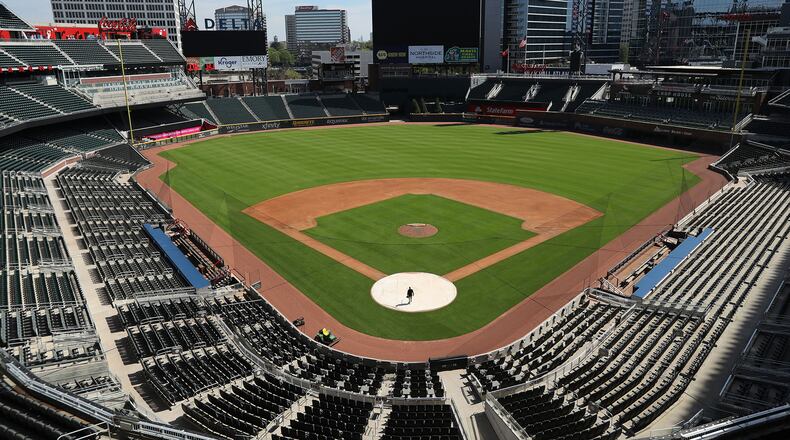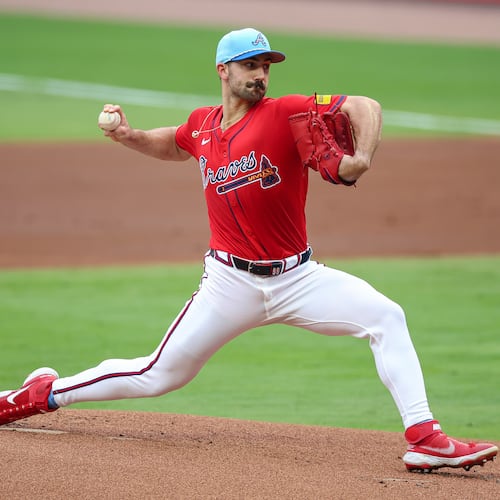Major League Baseball won’t be required to return next month’s All-Star game to metro Atlanta, a federal judge in New York decided late Thursday afternoon.
U.S. District Judge Valerie Caproni denied a request for a preliminary injunction that, if granted, would have blocked the move of the July 13 game from Truist Park to Denver.
The injunction was being sought by conservative small-business advocacy group Job Creators Network (JCN), which last week filed a lawsuit over MLB’s early-April decision to relocate the game to Colorado in response to Georgia’s new voting law.
Caproni ruled that JCN “lacks standing” to seek an injunction and “has failed to demonstrate that it is likely to suffer irreparable harm in the absence of an injunction.”
She issued the ruling at the end of a two-hour hearing in Manhattan.
“To say that the legal underpinnings of this lawsuit are weak and muddled is an understatement,” the judge said. “Plaintiff alleges that (MLB and the players’ union) were members of a conspiracy to violate JCN members’ constitutional rights … but I am still at a loss to understand how.”
Caproni added: “MLB voted with its feet when politicians in Georgia made a policy decision with which (MLB) strongly disagreed. For all this court knows, many of the small business owners in the Atlanta area agree with MLB that the policy decisions reflected in the new Georgia election law are poor policy choices. But whether small business owners as a group agree or disagree, are deeply divided or are agnostic on that issue, it is hard to see how MLB’s decision had an impact on the equal protection rights of small business owners as a group.”
MLB announced April 2 that it would move this season’s All-Star game and associated events, which were awarded in 2019 to Truist Park (then named SunTrust Park), out of Georgia. Commissioner of Baseball Commissioner Rob Manfred said in April: “I have decided that the best way to demonstrate our values as a sport is by relocating (the game). Major League Baseball fundamentally supports voting rights for all Americans and opposes restrictions to the ballot box.”
The lawsuit against MLB, Manfred, the MLB Players Association and MLBPA executive director Tony Clark was filed May 31 in U.S. District Court for the Southern District of New York because the headquarters of both MLB and the union are located there.
In extensive and pointed questioning of Job Creators Network attorney Howard Kleinhendler during Thursday’s hearing, Caproni pressed him on the lack of specific examples in the lawsuit of JCN members harmed by the move of the All-Star game. The only one cited by name, she noted, was a softball tournament organizer who said many teams dropped out of his event, scheduled in Atlanta next month, as a result of MLB’s decision.
The lawsuit, which contends Georgians will suffer “staggering” losses from the move of the game, seeks $100 million in damages to local small businesses and $1 billion in punitive damages. Thursday’s hearing pertained only to JCN’s motion for an injunction.
In “the assumption that (JCN) intends to continue this lawsuit” on the issue of monetary damages, Caproni said the court will schedule an initial pre-trial conference in July.
Thursday’s hearing featured lawyers for MLB and the Players Association in an unusual position: on the same side with one another.
“My client rarely agrees with Major League Baseball,” union attorney Jeffrey Kessler told the court, “but on this we are in agreement.”
In separate court filings early this week, MLB called the lawsuit “political theatrics,” and the Players Association called it “frivolous” and an “abuse of the judicial process.”
About the Author
Keep Reading
The Latest
Featured



